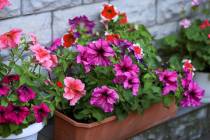Oldest community garden in Las Vegas turns 20
The Doolittle Express is on the right track. For 10 years, Master Gardener Don Fabbi has been coordinating and educating the gardeners, volunteers and neighboring residents at the Las Vegas Doolittle Senior Center Community Garden.
“This community garden has been assisting the hungry in our community,” Fabbi said. Whatever the gardener cannot use at harvest is donated to the Doolittle Senior Center Community.
“That’s how we came up with the name, Doolittle Express,” he said.
Fabbi tends the gardens every day, beginning at 7 a.m. He became a trained, certified University of Nevada Cooperative Extension Master Gardener volunteer in 1997. In addition to the Doolittle garden, Fabbi works at three other community gardens, logging more than 19,250 volunteer hours.
The Doolittle garden is associated with National Plant a Row for the Hungry Program. This program, initiated at the garden in 2003, has donated more than 6,500 pounds of surplus fruits and vegetables to the needy in the community.
The Doolittle garden, located at 1200 Blankenship Ave., was formally dedicated May 17, 1995, and is currently celebrating its 20th anniversary.
Divided into 51 individual beds, the garden has wide paths that allow handicap accessibility. The gardeners, many of Asian and African- American descent, bring their own unique vegetables to grow. Currently growing and thriving throughout the gardens are cotton, peanuts, sugar beets, rice, amaranth, quinoa, sorghum, sugarcane and five varieties of heat-tolerant potatoes.
The garden also serves as the Linn Mills Demonstration Garden for crops not normally considered to be easily grown in Southern Nevada’s Zone 9 climate zone.
“Eight varieties of fruit trees, herbs and a ‘pizza’ garden are grown here,” Fabbi said, “with tomatoes, oregano and basil and even the spring wheat for the pizza dough.”
He added, “Even the cacti surrounding the outer fence produce edible fruit for our gardeners and local residents, making the garden 99 percent edible.”
Local wildlife resides in the garden, too. The garden provides the four basic habitat elements needed for wildlife to thrive: food, water, cover and places to raise young. Meeting these criteria is how the garden became a National Wildlife Federation Certified Wildlife Habitat in 2007.




























